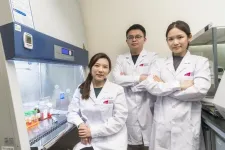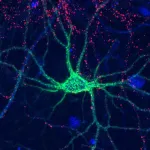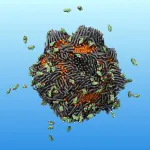(Press-News.org) SEATTLE, Wash. August 16, 2023–Distinguished global health leader Ibrahim Abubakar is the recipient of the 2023 Roux Prize for his dedication to improve health outcomes over the last three decades.
Now in its 10th year, the Roux Prize has been recognizing individuals all over the globe who have leveraged evidence-based health data to improve population health. The Roux Prize is awarded by the Institute for Health Metrics and Evaluation (IHME) at the University of Washington’s School of Medicine.
“Prof. Abubakar has been steadfast in his contributions to global health. His expertise and advocacy have directly affected policy implementation and the lives of millions of people,” said Dr. Chris Murray, Director of IHME. “Prof Abubakar embodies exactly what the Roux Prize represents: innovation, ambition, collaboration. The world of public health is a stronger place because of his ongoing contributions and commitment to change.”
Prof. Abubakar’s greatest achievement is his recent work on The Lancet Nigeria Commission that directly led to Nigeria passing a new law mandating basic health insurance and the creation of a vulnerable fund that covers 83 million underprivileged people. Leading an international multidisciplinary team in March 2022, he completed a comprehensive analysis of Nigeria’s health system supported by Global Burden of Disease (GBD) data. The research identified critical gaps and offered recommendations in key areas to improve health care staffing, information systems, and access to care for all Nigerians.
“What drives me each day is the firm belief that the existence of health inequalities is not a given – it is within our reach to eliminate inequitable access to care if we work collectively to improve the lives and conditions of the most disadvantaged among us,” said Prof. Abubakar, Dean of Faculty of Population Health Sciences at University College London.
Prof. Abubakar’s determination in pushing for fairness comes from his father, who was born in Nigeria’s north, one of the poorest regions in the world. His father lived under British colonial occupation amidst debilitating poverty, but was able to get an education and build a career as a civil servant. As a child, Prof. Abubakar saw the social and economic disparities in his home country through his father’s work. As an adult, Prof. Abubakar chose to study medicine in northern Nigeria to address the health inequities.
“My career veered to population health after witnessing the ravaging effect of HIV and other infections on my patients. As a young doctor, I distinctly remember patients arriving in my ward and dying of a preventable form of meningitis. Most of these patients were too poor and had been failed by society,” said Prof. Abubakar. “I believe my subsequent achievements and persistent commitment to medicine and public health had a lot to do with the contrast I have seen all my life: what is possible with levels of opportunity and wealth and the unfairness of outcomes.”
Prof. Abubakar has been instrumental in the development of health initiatives for tuberculosis (TB) and COVID-19. As the head of TB in Public Health England in 2015, he developed a research program that improved screenings. Prof. Abubakar also chaired committees, such as the WHO Strategic Advisory Group for TB, that led to better diagnoses and increased access to treatment, contributing to a 2% annual decline in new TB cases globally from 2015 to 2018.
In 2020, Prof. Abubakar was appointed as Scientific and Technical Adviser to the Nigeria Presidential Taskforce on COVID-19. He organized a team that responded to daily requests for evidence, aided in developing the type and timing of national COVID-19 restrictions, and wrote over 40 policy papers that ultimately served as a national vaccination policy. He is also leading an international study on COVID-19 variants, which includes cohorts from Europe, South America, Africa, and Asia.
“I feel lucky that my career and role allow me to have the privileges of working in a top university in the UK and impacting health policy in my adopted country, while being able to contribute to the generation of evidence that influences global health and health policy in Africa and Nigeria specifically,” said Prof. Abubakar.
As the Roux Prize winner, Prof. Abubakar will receive a $100,000 award to reinforce his efforts to support health systems in Nigeria and Africa’s Sahel region, benefitting some of the world’s poorest countries, among other significant global health programs. He will be recognized at an award ceremony on Oct. 12 in London.
IHME will accept nominations for the 2024 Roux Prize in September. Nominations are accepted globally and can include, but are not limited to, staff in government agencies, researchers at academic institutions, volunteers in charitable organizations, or health providers working in the community.
For questions about the prize, contact info@rouxprize.org.
For media interviews, contact media@healthdata.org
About the Roux Prize
The Roux Prize is sponsored by IHME’s founding board member David Roux and his wife, Barbara, and recognizes people worldwide for their innovative and impactful use of Global Burden of Disease data.
About IHME
The Institute for Health Metrics and Evaluation (IHME) is an independent global health research organization at the University of Washington School of Medicine that provides rigorous and comparable measurement of the world’s most important health problems and evaluates the strategies used to address them. IHME is committed to transparency and makes this information widely available so that policymakers have the evidence they need to make informed decisions on allocating resources to improve population health. For more information, please visit healthdata.org.
END
Professor Ibrahim Abubakar awarded 2023 Roux Prize
2023-08-16
ELSE PRESS RELEASES FROM THIS DATE:
Genetically modified neural stem cells developed by CityU and HKUMed researchers show promising therapeutic potential for spinal cord injury
2023-08-16
A research team co-led by City University of Hong Kong (CityU) and The University of Hong Kong (HKU) has recently made a significant advancement in spinal cord injury treatment by using genetically modified human neural stem cells (hNSCs). They found that specifically modulating a gene expression to a certain level in hNSCs can effectively promote the reconstruction of damaged neural circuits and restore locomotor functions, offering great potential for new therapeutic opportunities for patients with spinal cord injury.
Traumatic spinal cord injury ...
Coronavirus: Researchers develop new rapid and reliable detection method
2023-08-16
Commercially available mass spectrometers can reliably detect the SARS-CoV-2 coronavirus. In the journal "Clinical proteomics" researchers from the Martin Luther University Halle-Wittenberg (MLU) present a new method which employs equipment that is already being used in hospitals and laboratories to detect bacterial and fungal infections. It takes just two hours from swab to result. According to the team, the approach can also be easily adapted to detect other pathogens and could thus help in future ...
Spectrum of apps shrinks after ban on personalized ads
2023-08-16
A ban on using apps to collect data in order to personalize advertising would significantly reduce the spectrum of available apps and the number of updates, according to a study by the Technical University of Munich (TUM) based on the ban concerning Android apps for children. The findings can assist companies in defining their business models and policymakers when regulating targeted advertising.
Most smartphone apps are free. The providers finance them with advertising, often with what is referred to as targeted advertising: The apps evaluate data such as usage behavior and the user's location and even photos and messages ...
Sugars affect brain ‘plasticity,’ helping with learning, memory, recovery
2023-08-16
SAN FRANCISCO, Aug. 16, 2023 — Can you recognize someone you haven’t seen in years, but forget what you had for breakfast yesterday? Our brains constantly rearrange their circuitry to remember familiar faces or learn new skills, but the molecular basis of this process isn’t well understood. Today, scientists report that sulfate groups on complex sugar molecules called glycosaminoglycans (GAGs) affect “plasticity” in the brains of mice. Determining how GAGs function could help us understand ...
Clever coating turns lampshades into indoor air purifiers
2023-08-16
SAN FRANCISCO, Aug. 16, 2023 — Indoor air pollution may have met its match. Today, scientists will report that they have designed catalyst-coated lampshades that transform indoor air pollutants into harmless compounds. The lampshades work with halogen and incandescent light bulbs, and the team is extending the technology so it will also be compatible with LEDs.
The researchers will present their results at the fall meeting of the American Chemical Society (ACS). ACS Fall 2023 is a hybrid meeting being held virtually and in-person ...
What makes those pandemic-era sourdoughs so deliciously, uniquely, sour?
2023-08-16
SAN FRANCISCO, Aug. 16, 2023 — A few years ago, amid lockdown boredom, it seemed like everyone was perfecting their sourdoughs. A simple, fermented mixture of flour and water, the bread is powered by microbes that provide its one-of-a-kind tangy flavor. For over a hundred years, sourdough bread has been synonymous with San Francisco, where today, scientists will report that they’ve identified and quantified 21 key chemical compounds that make this bread taste and smell so unique. They’ve also compared the levels of the compounds in different breads.
The researchers will present their results at the fall meeting of the American Chemical Society ...
Cleaning water with ‘smart rust’ and magnets (video)
2023-08-16
SAN FRANCISCO, Aug. 16, 2023 — Pouring flecks of rust into water usually makes it dirtier. But researchers have developed special iron oxide nanoparticles they call “smart rust” that actually makes it cleaner. Smart rust can attract many substances, including oil, nano- and microplastics, as well as the herbicide glyphosate, depending on the particles’ coating. And because the nanoparticles are magnetic, they can easily be removed from water with a magnet along with the pollutants. Now, the team is reporting that they’ve ...
Tubing and swimming change the chemistry and microbiome of streams
2023-08-16
SAN FRANCISCO, Aug. 16, 2023 — With Labor Day approaching, many people are preparing to go tubing and swimming at local streams and rivers. These delightful summertime activities seem innocuous, but do they have an impact on these waterways? Today, scientists report preliminary results from the first holistic study of this question, which shows that recreation can alter the chemical and microbial fingerprint of streams, but the environmental and health ramifications are not yet known.
The researchers will present their results at the fall meeting of the American Chemical Society (ACS). ACS Fall 2023 is a hybrid meeting ...
Experiencing pain after a heart attack may predict long-term survival
2023-08-16
Research Highlights:
Experiencing pain – even pain not associated with heart disease – a year after having a heart attack is common, and people who had moderate or extreme pain were more likely to die within the next 8 years compared to adults who did not have any post-heart attack pain.
When recommending treatment and making prognoses for people who have had a heart attack, health care professionals should consider if the patients are experiencing moderate or extreme pain.
Embargoed until 4 a.m. CT/5 a.m. ET Wednesday, Aug. 16, 2023
DALLAS, ...
Racism, poverty, and illiteracy increase the risk of contracting and succumbing to AIDS in Brazil
2023-08-16
Social determinants of health —the social conditions in which people grow up, live and work— can influence the risk of contracting AIDS and the mortality associated with the disease. This is the main conclusion of a new study carried out by the Barcelona Institute for Global Health (ISGlobal), a centre supported by the "la Caixa" Foundation, and published in The Lancet Regional Health.
The research team evaluated a cohort of 28.3 million people, representative of the low-income Brazilian population, based on data collected between 2007 and 2015. This is the largest evaluation of social determinants of health ...




